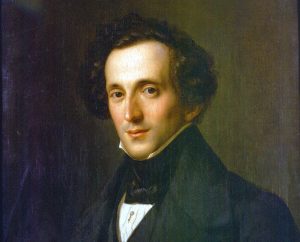
By Robert Croan
In brief but informative prefatory remarks about Mendelssohn’s Elijah, Brett Karlin — conductor and artistic director of the Master Chorale of South Florida — described this grand oratorio as a 19th-century equivalent of a modern Broadway spectacular.
It is certainly a major undertaking for a community-based choral organization, and the Chorale’s performance (seen Nov. 18 at Lynn University) was an inspiring and exhilarating experience from start to finish. As Karlin pointed out, you don’t have to be a believer in any religious doctrine to appreciate the message.
The composer Felix Mendelssohn (1809-47), a German of Jewish descent who was baptized as a child into the Reformed Christian church, in fact wrote Elijah more as a Romantic counterpart to Handel’s Messiah and other Baroque-era masterworks that he admired and sought to revive in his own brief lifetime. There are many parallels. Though neither is a liturgical work, each takes the listener into a dramatization of the life, death and accomplishments of a biblical figure, through purely through words and music, as the oratorio format maintains the arias, recitatives and choruses of opera, while eschewing the visual elements of the stage.
Quite unusual in music history, Mendelssohn composed the work simultaneously in two languages (German and English), with the world premiere — in English — occurring in Birmingham, England, on Aug. 26, 1846.
In contrast with opera, oratorio balances the choral and solo elements in favor of the chorus. With 111 members listed in the printed program, Master Chorale is capable of a huge sound in the work’s fullest moments. Karlin exploited the volume possibilities carefully, saving the giant outbursts for some electrifying moments, notably in the several choral calls to the false god Baal in the section describing the fire on Mount Carmel, and the mighty concluding chorus, “And then shall your light break forth.”
Clarity, along with fullness of sound, marked the hymnic “Thanks be to God,” at the end of Part 1, while at the other end of the sonic spectrum, the female voice trio, “Lift thine eyes,” sung spatially from another part of the auditorium, along with its following onstage chorus, “He, watching over Israel,” provided an exquisite segment of repose. It’s a long work, and Karlin made significant cuts, which brought the total time (including an intermission) to a little more than two hours.
To provide accurate perspective, this was an excellent community ensemble, with an excellent student orchestra, but there were some inevitable rough spots: sopranos wavered in pitch and vibration in some high sustained passages, while the tenors at the start failed to project their inner lines. These were small nits, however, in the overall picture, and some of the young instrumentalists in the Lynn Philharmonia shone on their own in brief but prominent solos: Megan Hagel’s cello in Elijah’s aria, “It is enough”; Hoon Chang’s oboe part in the heartfelt arioso, “For the mountains shall depart.”
Overriding the entire performance was the projection on the part of all participants of their love of making music, something that came through from first note to last in Karlin’s clear and controlled baton work. This is something too often lacking in the work of more renowned, highly touted performers.
The title part is a tour de force, in which the baritone soloist must sing explanatory recitatives, mellifluous arias of contemplation and dramatic outbursts, with lucid enunciation and a wide variety of color and nuance. Tyler Duncan, a faculty member at the Longy School of Music, filled the bill commendably, from his meaningful introductory proclamation (which, uniquely in this work, precedes the Overture) to the legato demands of his aria, “Lord, God of Abraham” and the powerful “Is not His word like a fire,” through the above-mentioned tender “For the mountains,” near the end.
Robyn-Marie Lamp’s sizable, sharply focused soprano was an asset to her solos, notably the grand aria, “Hear ye, Israel,” a particular highlight of the afternoon. Mezzo-soprano Clara Osowski sang with artistry and feeling, but her sound was too small, especially in the lower passages, and the delicate melodies of her aria, “O rest in the Lord” were lost to the overriding orchestral texture. Steven Soph was the least satisfactory of the solo quartet, his bright and buzzy tenor lacking legato in his arias, his diction sporadically marred by impure vowels.